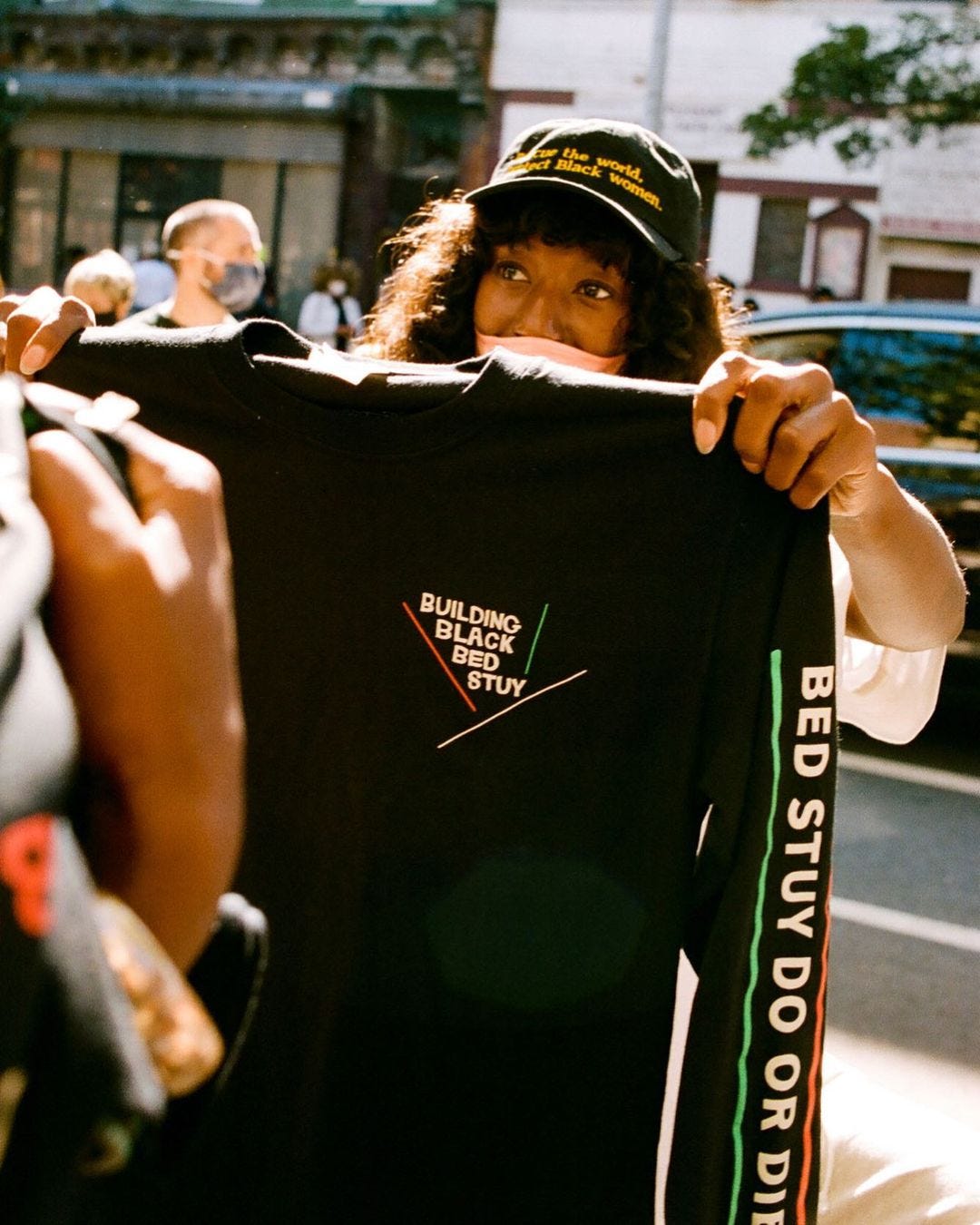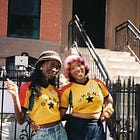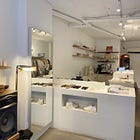From a Concept Store to an Economic Movement: How Kai Avant-deLeon Changed Bed-Stuy
"At the time when we started, we were one of two businesses on the Tompkins Avenue strip."
Sincerely, Tommy is one of those stores you wish you had in your neighborhood. Not only is the space tastefully (and intentionally) designed—boasting pieces you won’t find in department stores—it’s also home to community events and initiatives that improve the local quality of life.
At just 26 years old, the owner Kai Avent-deLeon opened Bed-Stuy’s first official concept store, a hub for discovering emerging designers and local talent. More than a decade later, she remains as committed to the neighborhood that raised her. In 2020, following the violent murder of George Floyd, she co-founded Building Black BedStuy, an organization promoting the economic empowerment of the local Black community. If you’ve ever grabbed a jerk chicken plate or bought organic shea butter one summer weekend on Tompkins Avenue, you’ve experienced Kai’s cultural imprint in real time.
In a city as competitive as New York, there aren’t as many entrepreneurs proactively investing in their communities while helping fellow businesses thrive. I recently caught up with Kai to look back at a decade of Sincerely, Tommy and discuss how her mission has evolved since opening the shop.
Long live Sincerely, Tommy!
This interview is part of my Local Spotlight series, where I chat with fashion business owners in NYC. If you love this kind of reporting, please consider upgrading to a paid subscription 😊
How would you describe the culture in Bed-Stuy that you tried to capture with Sincerely, Tommy? What was it like growing up there?
I would describe it as very community oriented. Just this very warm and welcoming energy that you feel in the neighborhood. I really wanted that for Sincerely, Tommy, along with just this mix of my own personal taste. And so it has a bit of Bed-Stuy, but also just a mix of what I have been inspired by through my travels.
Growing up in Bed-Stuy was pretty much the same. I remember always having a sitter who lived on the block—whether it was Mr. or Mrs. Wright—who are still the elders of the block. Or just people that I grew up with so it really just felt like home, a safe place. Everyone knows your name and that's super special, especially when it comes to growing up in a big city like this.
Tell me about the fashion scene in Bed-Stuy around the time you launched the store. Were people shopping and what were they mostly wearing?
I would say the fashion scene was still kind of low key. There was definitely a bit of Neo soul mixed with a raw, very eccentric New York style. [Bed-Stuy] was coming out of being predominantly Black so a lot of Black creatives still lived there. You’d see a lot of bright colors but as it started to move into gentrification, you were seeing more hipsters, more of the ‘90s street style.
I have always had my own style. I love playing with textures. I've definitely loved more funky pieces that stand out, but that are still classic. And so I think my style was a blend of those things—things that you would just have in your closet for a while. And all of the designers I was carrying at the time were emerging brands that were really different and set apart than what you would find in most stores in the city.
Sincerely, Tommy is championing what some would call the future of retail: curated, personal, culturally relevant and community-driven. In recent years, we’ve seen these boutiques struggle with rising rents and stiff competition in NYC. Is this form of retail profitable?
I would definitely say that Sincerely, Tommy was a pioneer in that we were the first concept store in Bed-Stuy as far as I know. From that perspective, we were profitable because no one else was doing what we were doing. We've been able to create our own community and really build something unique. The café was a huge part of making sure that there was always consistent foot traffic, especially in a neighborhood that is primarily residential. At the time when we started, we were one of two businesses on the Tompkins Avenue strip so having the cafe component just really allowed people to come in the space, and just have that consistent business because understandably, most people don't have $200 to spend on a dress.
As we've grown, I've also expanded the offering to have more moderately priced things. So you can find anything from $50 to upwards of $800 to $1000. As the neighborhood was changing, I noticed that there were younger people moving in, it was really important to have pieces that still felt accessible.
“Some of the brands that started with Sincerely, Tommy include Rejina Pyo, Collina Strada, Nanushka, and Tigra Tigra—a lot of brands that are now pretty big.”
What are some boutiques/brands or fashion people who have inspired/informed this specific approach to retail?
I definitely have a handful of brands or stylish people who've inspired me. Maryam Nassir Zadeh, Colbo (I love that they’re newer). [Colbo] came after S,T., but I love going there to see what they're carrying. I also really love French street style in general. There are a bunch of shops overseas that I’ve loved over the years that are sadly no longer open.
I would also say traveling; I love visiting markets when I'm in other countries and that probably has inspired me the most. Just seeing an older woman wearing a dress she's probably had for 20 years, whether it's kind of tattered and sun-faded. That to me is more inspiring than probably any store or stylish person I've seen, because I think it just takes such grace and ease to be able to carry those things off. So I honestly look forward to traveling more, and I think at this point, most of my shopping is done through vintage retailers online, because I am looking for those really classic pieces for myself.
You’ve said that you don’t follow market trends and that’s clear in the diverse and genuinely cool selection. How do you curate your pieces? And what are some brands you’ve championed from the beginning?
I think the curation is a mixture of whatever I'm gravitating towards, things that feel very natural, authentic, earthy. I don't follow trends. I really try to just stick to what I think is a beautiful piece that you would have in your closet for many years. Some of the brands that started with Sincerely, Tommy include Rejina Pyo, Collina Strada, Nanushka, and Tigra Tigra—a lot of brands that are now pretty big.
What’s an item or who’s a designer you can’t seem to keep in stock?
A brand we probably sell really well right now (that we've had for a few years) is Out of Seam; she [founder Tajah Ellis] is local. She uses old coffee grinds to dye her garments, and they're just very organic. I love her pieces! I love how creative she is, and how she thinks about putting pieces together.
I'm also really loving Bibio Project, a woman who also uses a lot of sustainable products or materials in her pieces. She's based in Ghana. I think her items are just so delicate plus the colors, textures…everything!
“I don't see as many stores now being experimental. There are some really great shops that exist, but I do think that back then, people were willing to take more risks.”
Have you noticed a difference in the way people shop today versus ten years ago?
I've definitely noticed a difference. I would honestly say that even though the neighborhood is feeling more densely populated [now], I prefer how it was 10 years ago because I think people shopped with more integrity. I know sustainability is more trendy now, but I honestly feel like there was just a level of interest in how things were made. It felt like there was more of an appreciation for the artistry behind the work.
New York City retail was booming at the time; we had Totokaelo, Creatures of Comfort, Opening Ceremony—these stores that were really experimental, carrying all these amazing brands. Going into a store felt almost like [going to] an art gallery because these pieces were just constructed so well. And I used to get really excited back then about shopping, or even just going in to look and feel inspired.
I don't see as many stores now being experimental. There are some really great shops that exist like Tangerine, Maimoun, Maryam Nassir Zadeh again and Colbo, but I do think that back then people were willing to take more risks, and there was just a bigger assortment, if you will.
Since launching over a decade ago, Sincerely, Tommy has become a hub for Black community building and economic support (I’m thinking about Building Black Bed-Stuy here too which has taken on a life of its own). How has your mission evolved since you first launched the store?
Building Black BedStuy has been such a great initiative! It was a response to us being in lockdown and being hyper-focused on what was happening around the shootings and overall oppression in our communities. I wanted to do something that felt like a response to building economic independence on a local level, so three friends and I gathered and decided to start this organization.
None of us expected it to turn out the way it did and now it's just become this hub of resources for local stores to keep their businesses going. We've done other initiatives around homeownership within the community, specifically for potential Black homeowners. And I would love to just stay on that trajectory and provide help and resources to people looking to purchase homes or start a business, or just connect with other business owners. I think it’s such a valuable resource to have.

“The most amazing moment was probably just opening my doors for the first time because I was 26. No one around me was doing what I was doing. No one in the neighborhood was doing what I was doing.”
What has been a milestone or favorite memory from being an entrepreneur?
There have been so many—from certain people I look up to who've come to the store to being recognized. Recently I was recognized by the neighborhood for being a legacy/legend. That was really monumental and I felt really appreciated!
Overall honestly, the most amazing moment was probably just opening my doors for the first time because I was 26. No one around me was doing what I was doing. No one in the neighborhood was doing what I was doing. And it was a huge risk to open a store at such a young age and, never in a million years did I expect to be here almost 11 years later and to have such a big community around it. So that's probably just something that even saying right now I'm like, “Wow, you know, we really can create whatever it is we want.”
What’s next for you or Sincerely, Tommy?
There are a couple things I’m working on, but I'm really just looking forward to continuing to create in ways that nurture me and hopefully nurture others.
Until next time,
Shelcy










I enjoyed learning more about Sincerely, Tommy and its impact on the fashion scene in Bed-Stuy. This story thoroughly covered S.T. and its owner, Kai, while also leaving a few stones unturned for me to dig deeper independently. Great read!